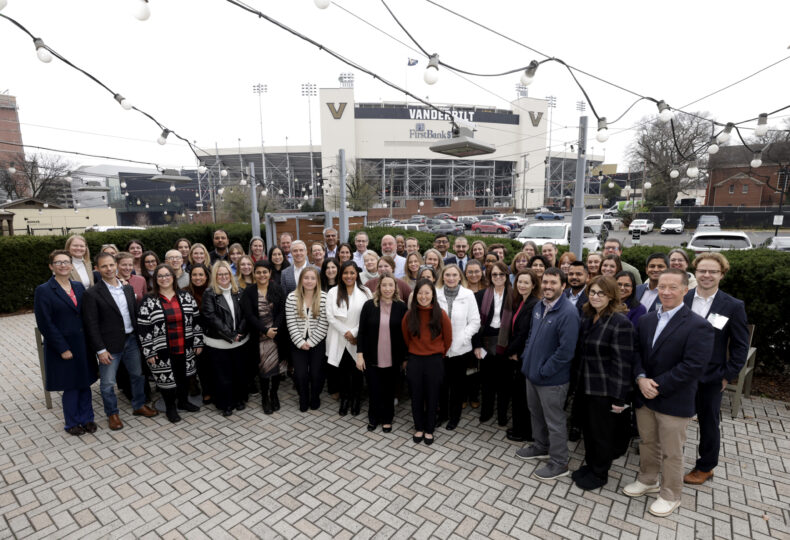Vanderbilt University Medical Center is working with scientists around the U.S. to launch the first phase 3, multicenter, placebo-controlled trial to determine the effect of immunomodulation on Long COVID (LC), also known as long-haul COVID or post-acute sequelae of COVID-19. The study is funded by the National Institutes of Health’s National Institute on Aging.

The Critical Illness, Brain Dysfunction and Survivorship (CIBS) Center and the Vanderbilt Coordinating Center (VCC) will lead the REVERSE-LC Trial, a study of an FDA-approved drug for rheumatoid arthritis and lupus being repurposed to treat patients with LC.
Collaborators from each of the six participating institutions ― VUMC, Emory University in Atlanta, University of Minnesota in Minneapolis, University of California San Francisco, and two scientific but non-enrolling sites, Yale University in New Haven, Connecticut, and University of Pennsylvania in Philadelphia ― are meeting at VUMC this week to launch the trial. They will hear in person from multiple patients, young and old, with LC, about how debilitating the disease is and how it has derailed their lives.
The trial, REVERSE LC, stands for the Randomized trial Evaluating Baricitinib on pERSistent nEurologic and Cardiopulmonary Symptoms of Long COVID. The drug is a JAK1/2 (janus kinase) inhibitor that is already FDA approved for the treatment of rheumatoid arthritis, alopecia areata and acute COVID-19. It’s believed that immunomodulators like baricitinib may be the most effective treatment for the lingering effects of LC.
“We’ve already shown that baricitinib saves lives in acute COVID-19, and it became the first immunomodulator with FDA approval for this indication,” said Wes Ely, MD, MPH, Grant W. Liddle Professor of Medicine and co-director of the CIBS Center. “Now it’s time to determine if it will help those suffering from Long COVID.”
About 200 million people are estimated to suffer from LC globally, including more than 15 million in the U.S. alone. It occurs more often in people who had severe COVID-19 illness, but even those with mild infections can experience it. LC is an infection-associated chronic condition that occurs after SARS-CoV-2 infection in which the patient suffers from dysfunction of one or multiple organ systems months to years later. It can manifest as shortness of breath, severe fatigue, post-exertional malaise, difficulty concentrating, memory changes, recurring headaches, dizziness or fast heart rate, sleep disturbance, and problems with taste or smell.
Specific problems can include lung disease, cardiovascular disease and arrhythmia, cognitive impairment, migraine, stroke, abnormal blood clots, chronic kidney disease, postural orthostatic tachycardia syndrome (POTS) and other forms of dysautonomia, myalgic encephalomyelitis/chronic fatigue syndrome (ME/CFS), mast cell activation syndrome (MCAS), diabetes, and other autoimmune disorders such as lupus, rheumatoid arthritis and ankylosing spondylitis.
Many of those living with LC have lost their ability to go to work or school and have trouble looking after children. The cognitive and functional limitations present people with life-altering disability. The CIBS center offers daily free Long COVID support groups to survivors and their families, creating a community in which they find healing and help.
The study, which will test the hypothesis that six months of baricitinib versus matched placebo will improve neurocognitive and physical function in LC, will enroll 500 patients age 18 and older who have had thinking and memory problems for at least six months after a COVID-19 infection. Those enrolled will participate for one year.
The Reverse-LC trial will evaluate the effects of baricitinib on motor control, executive function and memory as well as exercise capacity, cardiorespiratory fitness, post-exertional malaise, mental health and quality of life. It will also look at the drug’s effects on autonomic function and biomarkers (blood, cerebrospinal fluid and MRI).
“Long COVID turns on a harmful light switch that alters the immune system in a way that causes immense human suffering, and we need to know if we can safely turn off that light switch to help people find a pathway to recovery,” Ely said.
The research is supported by the NIH’s National Institute on Aging under Award Number R01AG085873.

















